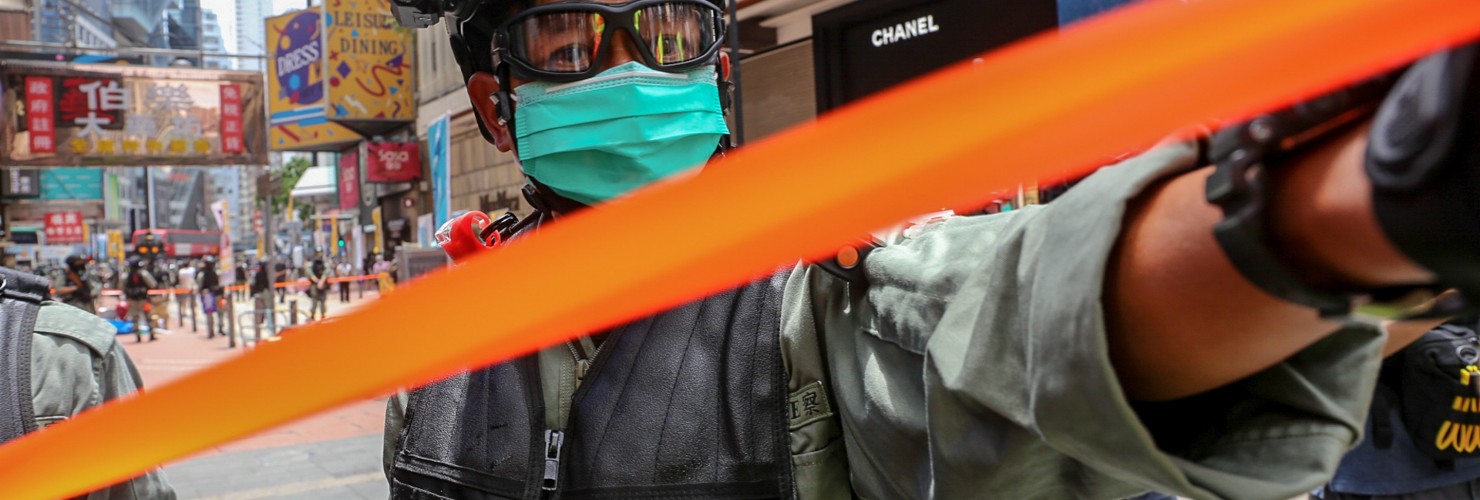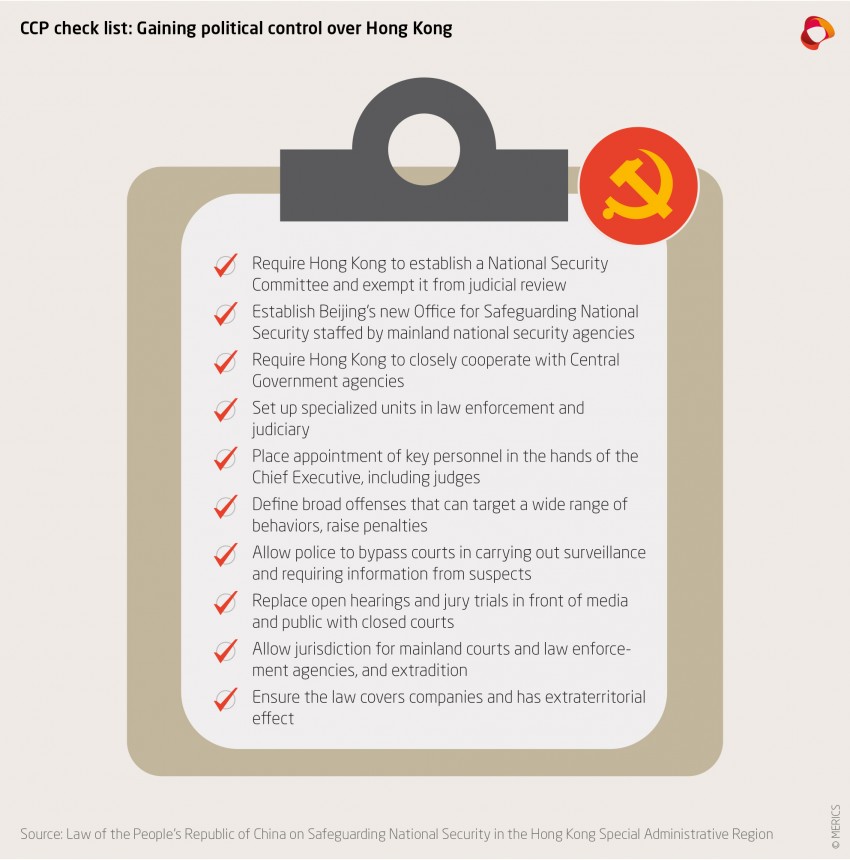

National Security Law closes Hong Kong’s window on the world
A new national security law for Hong Kong has been passed by the Standing Committee of China’s National People’s Congress, just six weeks after it was first announced, without consultation or feedback from Hong Kong stakeholders. The effects have been immediate, with vocal Hong Kong Twitter users deleting their accounts for fear of being caught on the wrong side of the law and political parties being disbanded. As thousands took to the streets to demonstrate when the law came into effect on July 1, the police arrested 370 protestors.
The law not only makes protest banners and slogans advocating for Hong Kong’s independence illegal; it massively expands the China Communist Party’s power over Hong Kong affairs and will fundamentally change the legal and social landscape of the formerly autonomous city. The law establishes parallel institutions for national security in the judiciary and law enforcement, and increases direct guidance and control from Beijing, sidelining oversight by an independent judicial system. It also requires the Hong Kong government to issue guidance over places of education, civil society, media and the online sphere.
While the law pays lip-service to protections guaranteed by China’s basic law and the United Nations International Covenant on Civil and Political Rights, it can be expected to severely restrain citizens’ rights. Just as in mainland China, citizens will still be permitted to demonstrate and express their opinions – as long as they demonstrate their approval of CCP rule and its policies. Although travel will still be possible, international actors should be aware: any person who violates the vague offenses set out under the law can be detained once they enter the territory.
Hong Kong is not just an important financial center but a platform for critical scholarship, investigative journalism and civil society work. The clampdown will have long-lasting effects on international dialogue and exchange. Hong Kong as a window between China and the rest of the world is closing.
Merics analysis: “The new national security law will have a dramatic effect not just on the life of Hong Kongers but also abroad. The EU and the US have, latterly, been vocal in their criticism, with the EU threatening to file a case against China with the International Court of Justice. The hurried introduction of the law effectively calls their bluff. The EU and US must show their colors and follow through with actions if they don’t want to encourage further transgressions.” MERICS analyst Katja Drinhausen.
More on the topic: Katja Drinhausen explores the topic in more detail here. MERICS also analyzed the situation in Hong Kong in a Policy Brief.
Media coverage and sources:
- New York Times: Harsh penalties and vaguely defined crimes
- The China Collection: Law Professor Donald Clarke provides a first look at the new law
- The Washington Post: New law sends a chill through Hong Kong
- South China Morning Post: Advocating independence for Hong Kong is now illegal
- South China Morning Post: 300 arrested as thousands join protest
- Xinhuanet: Full text of the new law in English
- The Guardian: Johnson promises bespoke visa for 2.9 million Hong Kongers
METRIX
14 million people have been affected by floods in southern China - the worst in 80 years - while police crack down on people posting footage of the events on social media.
Sources: South China Morning Post and Radio Free Asia.
Data-hoover TikTok? Copy-paste routines and censorship raise doubts over popular Chinese app
The facts: The popular video app TikTok owned by Beijing-based company ByteDance is under scrutiny for its data management and censorship practices. The app is currently being investigated by data protection agencies in Denmark and the Netherlands to check compliance with EU data privacy rules. Software experts have discovered that TikTok collects vast quantities of user data by accessing the copy-paste function on iOS devices, registering GPS locations every 30 seconds, and keeping track of other installed apps. The video app has been criticized for censoring content related to human rights issues and discriminating against less attractive or less wealthy users. TikTok has 800 million users worldwide, many of them under 25.
What to watch: While TikTok maker ByteDance has not yet commented on the ongoing investigations in European countries, it has pledged to stop accessing clipboard content on iOS devices. However, software experts have pointed out that the sheer volume of data collected by TikTok far outreaches that of other social media apps. India’s decision to ban TikTok and more than 50 other Chinese apps highlights the growing politicization of what was once mainly economic competition in the tech sector. ByteDance, whose relations to the Chinese Communist Party are unclear, is facing a tough struggle to avoid severe reputational – and possibly financial – damage.
MERICS analysis: “For now, it remains an open question whether ByteDance’s products, including TikTok, are merely entertainment tools with regretfully low data security standards, or an algorithmic testing ground for China’s authoritarian government going global. As it is difficult for app users to protect themselves, it is up to governments to keep a close eye on this and take necessary protective measures”, says MERICS analyst Kai von Carnap.
More on the topic: Kai von Carnap, Katja Drinhausen and Kristin Shi-Kupfer have analyzed data collection in the various digital solutions in China’s struggle against the coronavirus.
Media coverage and sources:
- Bored Panda: TikTok reverse-engineered data information collecting
- The Intercept: TikTok app discriminates users
- The Guardian: How TikTok censors videos that do not please Beijing
- The Verge: TikTok says it will stop accessing iOS clipboards
- Bloomberg: Denmark investigates TikTok for possible privacy violations
- Danish data protection authority: TikTok will be investigated (Danish language source)
Border skirmish and app ban put China-India relations under stress
The facts: A violent skirmish at the border has heightened tensions between India and China. 20 Indian soldiers died during the clash in the Galwan Valley on June 15. Both sides have blamed each other for instigating the incident but have also tried to de-escalate the situation in several rounds of talks, so far without visible progress. Bilateral relations are further burdened by India’s announcement to ban more than 50 Chinese apps, among them the popular video app TikTok (see story above).
What to watch: India has long maintained a non-aligned position, trying to maintain good relations with both the West and with its neighbor China, despite attempts by the US in particular to have India become a closer partner in confronting China’s ambitions in the region. This violent clash, how-ever, may push India closer to the West.
MERICS analysis: The worst clash between the Chinese and Indian militaries since 1967 comes at a time of increased global tensions, stoked by worsening US-China relations, the coronavirus pandemic and growing backlash against China’s international behavior. It is further proof of China’s growing assertiveness in the region despite the domestic and international pressures that Beijing is facing.
Media coverage and sources:
- The Guardian: Indian reactions to the boarder clash
- New York Times: Will India side with the West in confronting China?
- Chinese Ministry of Defense: Spokesperson claiming that India bears the responsibility for the clashes (in Chinese)
- The Hindu: India bans TikTok and other Chinese apps
- Xinhua: Chinese Foreign Minister Wang Yi urges closer communication between China and India to maintain peace
- India Times: Third round of talks but rival military build-ups continue
China opens up further to foreign investors
The facts: China has announced a raft of measures to attract foreign investment including reducing restrictions and launching new exchanges. The measures come as inward flows of capital fell 3.8 per-cent year on year in the wake of Covid-19, and as the new national security law is passed for Hong Kong. The negative list for foreign investors has been reduced from 37 to 30 items in the piloted free trade zones and from 40 to 33 items in the rest of the country. Meanwhile, China’s National Development and Reform Commission has announced the launch of several new exchanges in the Greater Bay Area. Guangzhou will be the home of both a carbon futures and a wealth management exchange, while Macao will see the launch of a Nasdaq-style tech bourse.
What to watch: To date, around 80 percent of foreign direct investment flows into China pass through Hong Kong. With the new exchanges and relaxed restrictions, that number will shrink, and Hong Kong may well become less important to the Chinese economy.
MERICS analysis: These policies will increase the amount of much-needed foreign investment flowing into the economy and, with more exchanges, allocation will also improve ensuring the best projects get the best money. However, with more pathways for inflow, the West – and pension funds in particular – will become more exposed to a market whose risks are poorly understood, says MERICS analyst Maximilian Kärnfelt.
More on the subject: Max Zenglein and Maximilian Kärnfelt discuss the risks to Hong Kong’s status and China’s caution in liberalizing its financial markets.
Media coverage and sources:
VIS-À-VIS
Maurice Gourdault-Montagne on Germany’s EU Presidency and Europe’s future China policy:
“Germany is for China a major western partner, which is listened to”
What are currently the most critical issues in EU-China relations? Were any of these enhanced by the corona outbreak?
China and the EU are two major strategic partners which means that stability and peace in the world depends, amongst others, on how they behave towards one another. As the first world trading partners, their contribution to world growth is fundamental. We know that the international situation prior to the pandemic of COVID 19 was already quite tense. There was the withdrawal of the United States from their multilateral commitments which was taking place while China and the US were waging a tough trade war.
These events have led the EU to redefine its strategic vision. The statement by the EU Commission, just before the state visit of President Xi Jinping to France in March 2019, to which Chancellor Merkel and EU Commission President Juncker had been also invited to proclaim together the importance of multilateralism, has given the Europeans a major asset which is the reshaping of our interests.
Yes, we are China's systemic rivals, we are competitors, but we are also partners. The Covid-19 pandemic has amplified tensions across the globe but the EU stance remains valid, while the US policy towards China will be exacerbated during the US presidential campaign. In this context, the issues which were at stake before the pandemic are still there: market access, technology transfers, protection of intellectual property, strategic investments, protection of the cyberspace, development aid and debt.
We can add the need for more self-reliance in some sectors such as pharmaceuticals to the list. Thanks to the pandemic we have become more aware of our dependency on China for medical solutions and need to see an opportunity to relocate such an industry to Europe. In that sense, the agreement for the protection of investments, when negotiated, would be the best tool and framework for a new start to EU-China relations.
What do you expect from Germany’s 2020 EU Council Presidency regarding the European Union’s policy towards China? Do you see any chance that it will succeed in pushing for a tougher EU line towards China? And will it be able to draft a document that would see a stronger demand for “reciprocity” and a new emphasis on “values”?
The 2020 Germany EU Council Presidency comes at a moment when all member states are trying to bounce back. It is crucial because the EU expects a lot from the German leadership, based on Germany’s leadership qualities shown during the crisis. We know that as a major western partner, China listens to Germany. In the balance of force with the EU, its market share with China and its investments are bigger than the ones of the other member states.
The German Chancellor announced the EU Leipzig summit with China in 2020 that would bring together each EU Head of State and Government with the Chinese President. But now even that has been delayed but it is of the utmost importance that this takes place as early as possible. During an online summit on June 22, the importance of the summit was made clear between Prime Minister Li Keqiang, President Xi Jinping, and the Commission President von der Leyen and President Charles Michel. This EU-China Summit would give an opportunity to each country to share clear common objectives and express their commitments towards one another.
Should we be tougher on China? The point is that we must always remember that the EU is not only an economic power but also a political project in which each member state shares a socle of common values, based on human rights for which each of our societies has fought for, for centuries. And these values must be repeatedly expressed each time they are called into question, and that is exactly what the new leadership of the EU does. What is at stake in the end, is the stability of the world, without which there is neither peace nor prosperity.
In times of rising confrontation between China and the US, what importance – do you think – has Europe in China’s global strategic outlook?
Yes, in this time of growing confrontation between the US and China, the EU, which is the traditional ally of the US, has a part to play in redefining the balance of forces in a multipolar world. The EU is a trade power but also has political significance which should be strengthened over the next years. It would be reckless to embark on a crusade against China for whatever reason.
Let’s be realistic. China for its own development needs our partnerships in many fields, be it investments, joint ventures, new technologies – all of interest for their rising middle class – and we need the Chinese market on our side for our own growth. Yes, we can see that there are Chinese “Wolf Warriors”, just as there are also European ones. If we would not need to protect ourselves, we would not need this kind of warrior. When the pandemic comes to an end, let us take the opportunity to give a new realistic start to EU-China relations in which all sides agree upon a realistic understanding for the defense and promotion of their own interests. For that purpose, let us work in such a way that the EU member countries are well coordinated and remain united.
Maurice Gourdault-Montagne is the former Secretary-General of the French Ministry of Foreign Affairs, former French Ambassador in China and member of the MERICS advisory board. The interview was conducted by Kerstin Lohse-Friedrich, Director Communications, MERICS.
MERICS analysis: “Mastering EU-China relations: German presidency is faced with challenges.” Short analysis by MERICS Fellow Grzegorz Stec.
PROFILE: Shen Jilan
China's longest-serving member of the National People's Congress dies aged 91
She sat in the National People's Congress for longer than any other delegate - since 1954 - and was considered its most zealous yes-man when it came to approving government bills. Now Shen Jilan has died at the age of 91.
Party-state media marked the passing of Shen Jilan, who was born in a remote mountain village and base for the Communist Party in Shanxi province in 1929. Before the 70th anniversary of the founding of the People's Republic in autumn last year, Shen, who was also lauded as a committed fighter for women's labor rights, received China's highest state honorary award. As early as the 1950s, she advocated "equal pay for equal work" for men and women.
However, Shen was not only known as a champion of the interests of the people. She also achieved dubious fame through her unconditional support for the Chinese Communist Party: not once in her six decades as member of the NPC did she vote against a CCP proposal.
Her total obedience repeatedly earned Shen the wrath and ridicule of Chinese netizens, especially in the early 2010s when online discussions were less censored and monitored.
Media coverage and sources:
- China Daily: Obituary for Shen Jilan
- South China Morning Post: China’s Communist Youth League removes post attacking Shen
- DW: Portrait of the National People‘s Congress
- China Digital Times: Political cartoon of the most zealous yes-woman in China’s National People’s Congress
MERICS China Digest
MERICS’ Top 3
- The Associated Press: Beijing takes draconian measures to cut birth rates among Uighurs and other minorities in Xinjiang
- ABC: China accuses Australia of espionage
- CNBC: China reports another plunge in tourism revenue as recovery from coronavirus shock drags on
International relations
- US Defense Department: China becoming a concern for US commanders in Europe
- Wall Street Journal: US presses Europe to uproot Chinese security-screening company
Politics, society and media
- China Daily: Xi Jinping calls for a stronger CCP as the Party turns 99
- BBC: New swine flu virus with ‘pandemic potential’ discovered in China
- South China Morning Post: How data-driven solutions helped regain control over new out-break in Beijing
Economics, finance and technology


